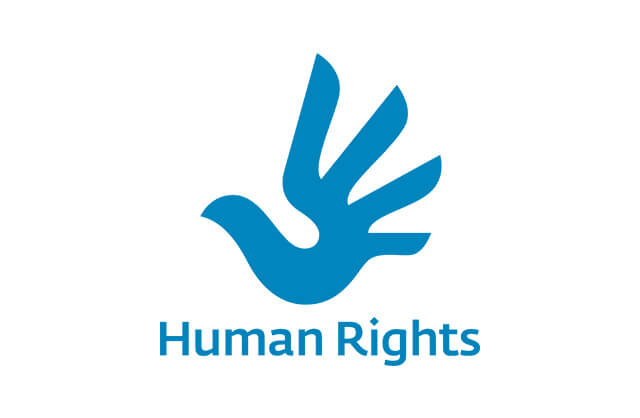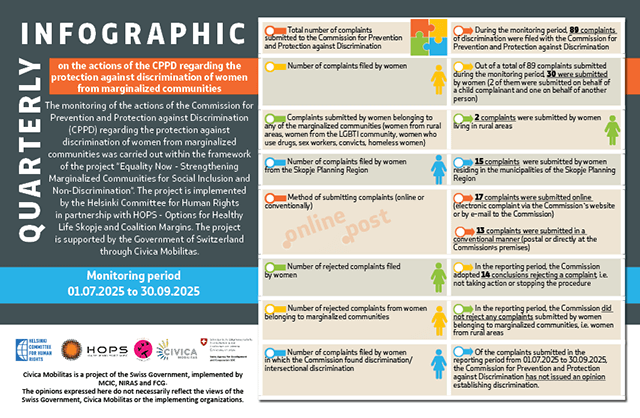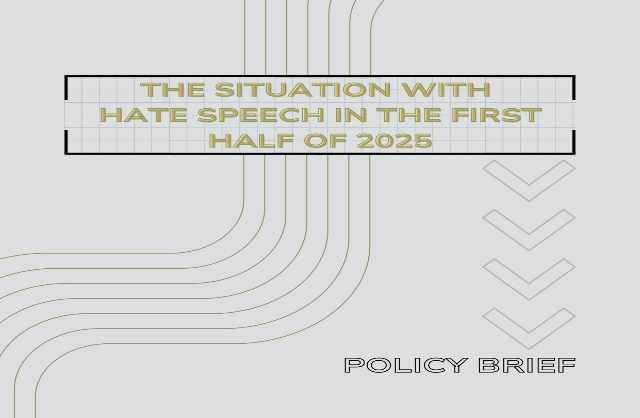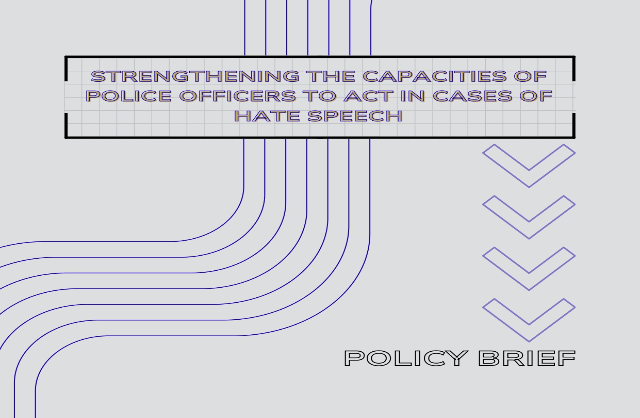Monthly report – April 2016
May 20, 2016

The Monthly report on the human rights conditions in the Republic of Macedonia for April 2016 includes the following topics: Court returns first verdict confirming mobbing in Macedonia; Pardons of politicians and their collaborators by the President; Protests and arrests; Refugee crisis.
COURT RETURNS FIRST VERDICT CONFIRMING MOBBING IN MACEDONIA
The Helsinki Committee for Human Rights was constantly monitoring the court proceedings on the charge of mobbing which was being conducted at the Basic Court Skopje II Skopje. The Basic Court Skopje II returned a verdict last month, in which psychological harassment at workplace was determined, and thereby the first verdict confirming mobbing in Macedonia was delivered.
Namely, the Basic Court Skopje II returned a verdict with which it determined psychological harassment by the defendants, which caused mental anguish, fear, humiliation and violation of dignity, integrity and honor of the plaintiff, with the ultimate aim to force the plaintiff to abandon his workplace. In its verdict the Court enjoins that the defendants must discontinue the practice of psychological harassment of the plaintiff at his workplace, and to create conditions for adequate estimation of his work.
Namely, despite the fact that in May 2013 the special Law on Protection against Harassment at Workplace was adopted, according to which any form of harassment at workplace, as well as any abuse of rights at workplace is prohibited (Article 4), to date not a single final court judgment which would establish such harassment has been delivered, i.e. not a single positive verdict which confirms mobbing.
According to Article 5, Paragraph 1 of the aforementioned Law, psychological harassment stands for any negative behavior of an individual or a group, which is recurring, continuous and systematic, which amounts to violation of the employee’s dignity, integrity, reputation and honor, and causes feelings of fear, or causes embarrassment and humiliation, with the possible ultimate aim to hurt the employee’s mental and physical health, to compromise his/her professional future, or to cause him/her to terminate the employment or abandon the workplace.
According to Article 6, Paragraph 1 of the same Law, perpetrator of harassment at workplace may be one or more persons characterized by negative behavior, regardless of their status – employer in the capacity of natural person, a person in charge working for the employer, legal entity, an employee or a group of employees engaged by the employer, or a third person with whom the employee or the employer come in contact while performing the particular duties associated with their workplace.
In this particular case, the Court determined that the plaintiff was subjected to mobbing in the form of psychological harassment by two persons at his workplace.
The plaintiff was subjected to mobbing through being denied adequate working conditions; he was also denied his constitutionally guaranteed right to vacation leave; he was placed in isolation and was not being given any work tasks or direction; he was denied access to the electronic system of information, and was not being sent to professional training courses, unlike the other employees, with the aim to suffer degradation and humiliation.
Recommendation: The Helsinki Committee compliments the decision of the Civil Court, and holds that it is of exceptional importance, being the first Court decision of this type. Considering that mobbing is a common phenomenon bearing serious consequences, but is nevertheless very rarely reported, the Helsinki Committee believes that this decision represents a significant step towards building legal practice which would in the future encourage victims of harassment at workplace to report such case. Additionally, worthy of compliment is the entire litigation process conducted by the Court Council, monitoring which the Helsinki Committee’s observes noted no irregularities.
PARDONS OF POLITICIANS AND THEIR COLLABORATORS BY THE PRESIDENT
On the 12th of April, the President of the Republic of Macedonia Gjorgje Ivanov announced collective pardon of 56 suspected perpetrators of criminal offences, against whom criminal charges have been pressed and criminal procedures initiated. With this act the President of the Republic of Macedonia Gjorgje Ivanov overstepped his constitutional and legal authority and thereby committed the criminal offense Misuse of official position and authorization, as stipulated in Article 353 of the Criminal Code of RM. Namely, the President adopted the stance and passed the decisions on pardon without legal basis, considering that Article 11 of the Law on Pardon to which he appeals has actually been annulled, and is currently not part and parcel of the Republic of Macedonia’s legal system. The Constitutional Court of the Republic of Macedonia annulled the Law on Amending the Law on Pardons of 2009, which act, however, cannot bring back to life the annulled Article 11 of the Law on Pardons, which used to bestow on the President exclusive right to pardon perpetrators of criminal offences without prior procedure undertaken by the Ministry of Justice.
On the other hand, with this act the President obviously overstepped his authority, because under the pretense of pardon, which is an act envisaged for particular cases as a corrective of justice in very specific and especially justified cases, he in essence and de facto usurped the authorization for group and collective amnesty of a significant number of criminal offences, and thus breached the authorization which, on account of its gravity, the Constitution relegates to the Assembly of the Republic of Macedonia as its exclusive right. The fact that this is a case of amnesty, and not pardon, is further supported by the President’s statement that in the future he would also pardon other persons against whom proceedings might be initiated by the competent institutions, as well as by the collective explanation of the alleged “pardon”, the causes of which are sought in the political conditions (conflicts) in the country.
With this act of his, the President has placed himself above the law, above the Parliament, and above the political agreement of Przhino, thereby essentially revoking the Special Public Prosecution’s competences. This is probably the sole example in history of a democratic country’s President who has pardoned mass and organized violation of human rights and freedoms, including cases of violations of the constitutional right to free elections, violations of privacy, corruptive and other abuses of the political elite, all of which were previously noted in a series of credible and serious domestic and international reports of a host of Governmental and Nongovernmental organizations. An act of this kind is not only an act of demolishing the legal state, but also a serious breach of the international obligations regarding protection of human rights, ratified by the Republic of Macedonia.
The state has positive obligation to ensure free exercise and protection of the human rights envisaged in the European Convention and in other international agreements on protection of human rights. It also has clear procedural obligations regarding thorough and efficient investigation of violations of human rights, punishing the perpetrators and prevention of similar cases in the future. With pardoning some of the criminal offences included in the President’s decision, in this sense de facto are violated the obligations issuing from Articles 2 and 3 of the European Convention, which guarantee right to life and prohibit torture, inhuman and degrading treatment. Also discernible is mass violation of human rights to privacy, as stipulated in Article 8 of the European Convention, considering that the state should respect this Article as well, and is thus obliged to provide efficient control over the possible misuses stemming from the unlawful wiretapping.
At the same time, by preventing the unfolding of the criminal proceedings, the President violated the rights of the victims of these abuses, by depriving them of effective legal remedy which would provide criminal, moral and material satisfaction to the victims. With this Article 6 of the ECHR is breached, in the sense of preventing efficient access to Court, as well as Article 13 of the ECHR, on account of rendering inoperative the efficient legal remedy for protection of violated rights and freedoms. With the aforementioned actions, the President and N. N. person or persons who provided him with the data regarding the active criminal procedures, committed the criminal offence of violation of confidentiality of procedure, as stipulated in Article 369 of the Criminal Code, and in connection with Articles 289 and 299 of the Code of Criminal Procedure, which envisage confidentiality of criminal proceedings.
Recommendation: The hastiness and groundlessness of the particular decisions becomes especially obvious in the cases of persons who have been pardoned despite the fact that they were not suspects in any criminal investigation. There are thus individuals among the pardoned persons who have only been subjected to searches in relation to other suspects, as well as individuals who have been criminally charged, but no criminal procedure has been initiated against them. Article 19 of the CCP clearly stipulates that criminal procedure begins with order for investigation or previously undertaken specific investigative activity, which is not the casewith some of the pardoned persons.
PROTESTS AND ARRESTS
According to the information with regard to the ongoing protests presently available to the Helsinki Committee, on 13 April 2016, 13 persons were apprehended, against 11 of whom misdemeanor sanctions were pronounced, on account of an offence related to Article 14 of the Law on Disturbing Public Peace and Order, due to alleged actions contrary to order of competent state authority, or of authorized official representing competent state authority, that forbids access to or lingering on a certain location. Two persons were brought before a judge in a pre-trial procedure and put under house arrest in duration of 8 days. All 13 persons were held at a police station up to 24 hours, although the persons against whom misdemeanor sanction have been pronounced – on account of committing misdemeanor offence – according to Article 50, Paragraph 3 from the Law on Police, should not have been detained for longer than 12 hours.
Some of the participants in the protest approached the Helsinki Committee and informed us that during the last week more than a few persons were summoned to a police station for questioning. As far as that group is concerned, we have been informed that only one persons was suspected of committing the criminal offence “Participating in a crowd committing a criminal offence”, of Article 385, Paragraph 1 of the CC, on account of which he was put under house arrest in duration of 8 days. The sanction envisaged for this criminal offence is a fine or a prison sentence of up to 3 years; it is considered a minor offence, which on principle should not entail house arrest, i.e. it would be more fitting to assign a milder cautionary measure, like regular reporting to an assigned official. The Basic Public Prosecution appealed the house arrest decision, but the appeal was rejected by the Criminal Council of the Basic Court Skopje 1 Skopje
We would like to inform the public that several participants in the protest were summoned for questioning. The Helsinki Committee provided with legal representative the individual Zdravko Savevski, who was summoned for questioning in a police station, and then escorted to the Basic Public Prosecution Skopje.
The Committee holds that the purpose behind summoning participants in the protests to questionings is their intimidation, but also intimidation of other present and future participants in the protests. We would like to underline that the house arrests decisions have extraordinary influence on restricting the right to protest, on account of the fact that as a reason for pronouncing this measure is stated that the detained persons could repeat the criminal offence, considering that new protests are announced.
Besides, the detention and house arrest measures, as well the decision to initiate criminal procedure against these persons, may be considered as a warning to the rest of the citizens who participate in the protests taking place during this period. These actions are in breach of Article 21 of the Constitution of the Republic of Macedonia, which stipulates that the citizens have the right to assemble and express public protest without prior notification or special permit; the exercise of this right may be restricted only in conditions of war or state of emergency, which is presently not the case. In comparison, the Committee had its observers at the violent protests in front of the Center Municipality premises, which took place in 2014. No court procedure has been initiated against the participants in those protests, wherefore we conclude that what we witness is a case of selective justice.
Recommendation: The Helsinki Committee appeals to the judges who pass decisions on pronouncing and extending measures for ensuring presence, to take in consideration the fact that this is a case of minor offence which does not require pronouncing detention or house arrest measures, as well as the fact that most of the involved persons do not have a history of previous criminal offences.
REFUGEE CRISIS
On 10 April, several hundred refugees and migrants who have been dwelling for more than a month and a half in the improvised camp close to Idomeni, started making organized efforts to break through the border fence and to enter Macedonian national territory. In the course of the attempt they were informed by the MI that their entry into Macedonia is not allowed, because all borders on the Balkan route remain closed. The group was warned against use of force, or else the police officers would be forced to apply security measures. Soon after the warning, some of the refugees and migrants started throwing stones and hard objects over the fence and toward the police officers. This reaction prompted the Police to respond with stun grenades and teargas, as well as – according to the refugees’ allegations and the presented bullet casings at Idomeni – rubber bullets, firing them from Macedonian to Greek soil, where the Greek Police was conspicuous by its absence. Smaller groups of about twenty refugees and migrants, managed to enter Macedonian territory at a point approximately 300 meters away from the entry gate, but were soon apprehended and sent back to Idomeni.
The situation in the Temporary Transit Centers Tabanovce near Kumanovo and Vinojug near Gevgelija is still a cause of concern. Namely, the Centers were intended only for transit, while in fact they have been used for more than four months as dwelling centers. The lack of adequate infrastructure, medical protection and recreation, as well as the authorities’ failure to act in accordance with the Strategy for Integration of Refugees and Foreigners in the Republic of Macedonia 2008 – 2015, seriously worsens the refugees’ psycho-physical health. The refugees reside with unregulated status, and according to their statements, they are even not being allowed to submit applications for recognition of refugee status, which is in breach of the Law on Asylum and Temporary Protection. After the Balkan route was closed in March 2016, around 1,500 refugees had remained in camps on Macedonian territory, while by the end of April, this figure was reduced to around 750. There are almost daily reports in the media on incidents related to trafficking and smuggling of refugees who have entered the country illegally. Part of them are being accommodated in the Reception Center for Foreigners in Gazi Baba, while the majority is being deported to Greece.
Recommendation: The Helsinki Committee appeals to the police officers who are exerting police authority and maintaining public order and peace, to ensure the necessary protection of the refugees and migrants, to respect their rights, and not to use excessive or disproportionate force or activities. While using chemical materials and other means of coercion, the police officers should undertake every precautionary measure possible to prevent endangering the refugees’ and migrants’ life or health, as well as to protect their physical and moral integrity. It is high time for the authorities to start implementing the Strategy for Integration of Refugees and its Action Plan.


